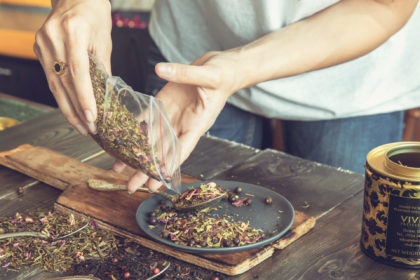
Tea connoisseurs have long believed that black tea’s flavor comes from the chemicals created during oxidation, but a new study reveals microbes at play. Black’s tea’s rich flavor is partly due to fermentation, the same microbial process used to create fermented teas like kombucha, jun and pu’erh.
What does this mean for tea producers? By adjusting the microbes on the tea leaves, fermentation could amplify the flavor in the final brewed cup of tea.
“The finding that bacterial and fungal communities also drive tea processing suggests the microbiome of the leaves can be manipulated to create greater quantities of tasty compounds due to fermentation,” says Dan Bolton, founder, editor and publisher of Tea Journey.
In research published in the Journal of Agricultural and Food Chemistry, a team of scientists from Anhui Agricultural University in China studied how sterilization of tea leaves affected tea flavor. They began by sampling the microbes on leaves from the Dongzhi tea plantation in Anhui province. Half the leaves were sterilized in mild bleach for five minutes — the other half were left untouched. All the leaves were then processed traditionally: withered, rolled, oxidized in the sun and dried.
Their conclusions found black tea produced through microbial fermentation from the unsterilized sample was full of catechins and L-theanine. Catechins are flavonoids and a naturally-occurring antioxidant; L-theanine is an amino acid (also found in mushrooms) known to ease stress and insomnia. Both compounds help make tea flavorful. The sterilized leaves produced tea that didn’t have the same amount of compounds, and so wasn’t as flavorful.
“The sterilization process dramatically decreased the content of total catechins and theanine in black tea, indicating that microbes on the surface of tea leaf may be involved in maintaining the formation of these important metabolites during black tea processing,” says Ali Inayat Mallano, PhD, professor at the university.
Interestingly, sterilization had no effect on green tea. Both samples of green tea, sterilized and unsterilized, had the same levels of caffeine and theanine.
[To explore premium dark teas, TFA recently organized a webinar Beyond Kombucha: Pu’erh, Jun and Dark Tea with Bolton and tea experts Jeff Fuchs (author, Himalayan explorer and co-founder of Jalam Teas) and Brendan McGill (chef and James Beard nominee who owns Hitchcock Restaurant Group in Seattle and Junbug Kombucha).